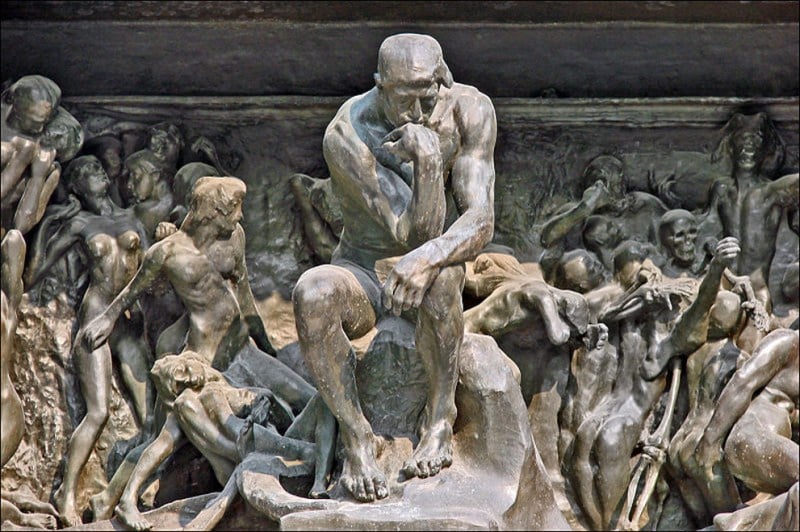I am a theoretician. This is an ideal of life I have devised for myself. It means spending my time employing simply the power of mind and will to conduct inquiries about the world. But choosing such a name, “theorizing,” for the main activity of one’s life can often be met with suspicion. A theoretician spends their life on thinking, whereas good life requires living. It seems that thinking all the time and living stand in contradiction.
An academic who wants to argue for their theoretical disposition could say that most of us agree that there is something unique about the human capability to think and they want to simply exercise that which is uniquely human. Less pretentiously, one could say that indeed thinking all the time makes us operate on high levels of generality that take us away from practical considerations. But sometimes we can be useful when we come up with ideas that just happen to capture people’s imaginations and inspire them to actually do something good for society.
In the first case, one admits that they indeed choose theorizing as opposed to practice. In the latter case, one admits the same, but in a more apologetic tone, adding that they still can, although probably more by accident, bring something to the realm of practice.
However, although one can accuse someone of being “just” a theoretician, it is rarer to accuse someone of just practicing life. This, I think, comes from an intuition that theorizing very often is at risk of being futile, cold, out of touch with reality, with what actually matters.
This intuition is very often simple anti-intellectualist sentiment. But there are two sources that give this intuition some truth. Thinking about them can better our notion of what an ideal of theorizing could be, and thus perhaps say something new about why it is not an endeavor opposing broadly understood practice.
Firstly, the research of those who label themselves as theoreticians often are precisely what they are accused of being: futile, cold, out of touch with reality, with what actually matters. They treat developing a complex mathematical theory or philosophical argumentation as a game. Or they decide to study the most particular details of various theories or of history only because they ephemerally seemed curious, and not because they justifiably gave a promise to reach truth.
Secondly, theoreticians often assume such “escapist” positions because practice is generally viewed as more significant than theory, and deep inside these theorists do not resist this general view. They reject the idea of theorizing about something important because in truth they think that theorizing is never too important. They accordingly believe that theorizing can do little on its own. They must kneel before the discoveries of Natural Sciences or the experience of Everyday Life and only in this state conduct theorizing.
Of course, interest in all other disciplines of human action is key to being a good theoretician, but if a theoretician does not believe they are free to discover truth primarily by means of theorizing, they start playing a role of superfluous servants to other spheres of human action. Thus, often a contemporary theoretician will say: “In my discipline, we are not responsible for reaching truth; it is not elegant to claim that we know how to reach truth.” Maybe it is inelegant, but then what is the purpose of theorizing! Should society even pay for such minimalistic theorizing? Why should society pay for such theorizing! The theoretician’s role is to broaden our horizons, not to claim that they are so infinitely small that we cannot even aim for truth.
The philosopher George Berkeley complained roughly three centuries ago in “The Guardian” that many of his contemporaries were indulging in theorizing about most minute, particular matters and had the arrogance to claim that this was enlightened and open-minded, compared to theorizing about bigger things such as physically unreachable places in the universe, non-ordinary things in the human realm and God. For Berkeley, it was engaging with such bigger things that could give us hope for broadening horizons. Furthermore, in Berkeley’s words: “That frame or disposition which is called largeness of mind” is necessary “towards forming a true judgment of things.”
The phrase “true judgment” is anachronistic given its emphasis on “judgment.” We can renovate the whole sentence by saying: Ambition to broaden horizons is the first necessary step to truthfulness.
A good theoretician, then, should avoid two behaviors. One is a tendency to abstract from reality, another is a complete lack of faith in theorizing. The former is mistaken, for it engages in what is not true, and it does so deliberately. The latter is inauthentic insofar as it is inauthentic to do that in which one does not believe.
Both of those behaviors are, in fact, only somewhat different from each other. They are two sides of a certain disposition that does not take one’s life and one’s responsibility towards the world seriously. But we should bear in mind that such disposition is also present among those who never considered becoming theoreticians.
Now, I want to be a theoretician not because of being fearful and trembling about living, but out of joyful belief in life. Such trust necessitates bravery to experience life as fully as possible. But to first imagine such experiential vastness one must be at the same time broadening horizons, and that I personally feel to be best achieved by truthful inquiry. Namely, theorizing.
The Daily is committed to publishing a diversity of op-eds and letters to the editor. We’d love to hear your thoughts. Email letters to the editor to eic ‘at’ stanforddaily.com and op-ed submissions to opinions ‘at’ stanforddaily.com.
